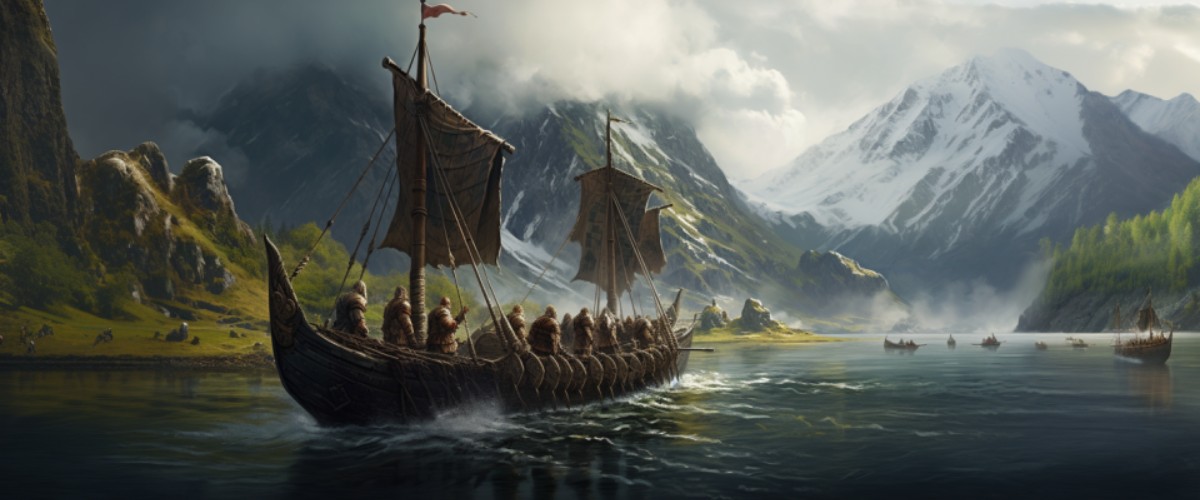The Viking Age, spanning from 793 to 1066 AD, unfurls a vibrant tapestry of exploration, conquest, and cultural exchange across Europe, Asia, and North America. It demarcates a significant era where Norse seafarers played pivotal roles in shaping territories, engaging in trades, and fostering relationships, while also instilling fear with their notorious raids.
Background: The Winds of Change and Conquest
- Origins and Influencers
- The Vikings, hailing predominantly from Scandinavia (modern-day Denmark, Norway, and Sweden), were motivated by a blend of environmental, social, and economic factors.
- Influential figures like Harald Fairhair, who aimed to unify Norway, and Rollo, who founded the Duchy of Normandy, were seminal in spearheading voyages and establishing Viking dominance.
- Motivating Factors
- Overpopulation and limited agricultural resources in Scandinavian lands propelled the Vikings to explore and settle in new territories.
- Technological advancements in ship-building and navigation enabled these seafarers to venture further and with greater efficacy.
Major Happenings: Raids, Explorations, and Settlements
- Ravaging Raids
- 793 AD: The raid on the Lindisfarne monastery marked the inception of the Viking Age.
- Subsequent attacks targeted monasteries, villages, and towns across Europe, leveraging the element of surprise and adept naval capabilities.
- Exploration and Expansion
- Exploration of new lands such as Iceland, Greenland, and eventually reaching North America (Vinland).
- Varangian Guard: Vikings who ventured east, forming an elite unit in the Byzantine Empire.
- Colonisation and Conquest
- Vikings established significant settlements in various regions, including the British Isles, France (Normandy), and Russia.
- 1066 AD: The Battle of Stamford Bridge, often cited as the close of the Viking Age, where King Harald Hardrada of Norway was defeated.
Immediate Outcomes: A New Dawn of Integration and Conflict
- Societal and Geographical Transformations
- The formation of diverse territories, such as the Kingdom of the Isles in Scotland and the aforementioned Duchy of Normandy.
- Vikings established trade routes, connecting the East and West, facilitating the exchange of goods, culture, and ideas.
- Technological and Cultural Exchanges
- The adoption of Viking shipbuilding technology and navigation methods by communities and nations they encountered.
- Cultural and genetic integration within settled areas, influencing language, law, and customs.
Long-term Impact: Echos Through the Corridors of Time
- Political Repercussions
- The establishment of ruling dynasties, notably the Norman conquest of England in 1066, forged new political landscapes in Europe.
- Cultural and Social Imprints
- Vikings influenced various aspects of society, including language (e.g., Old English), technology, and societal structures in places they settled.
- Norse mythology and sagas have been preserved and continue to enchant generations with tales of gods, heroes, and mystical realms.
- Genetic and Anthropological Footprints
- Genetic studies reveal Viking lineage dispersed across numerous nations, providing a biological testament to their expansive ventures.
- Archaeological finds, such as the well-preserved Gokstad ship, continue to offer insights into Viking life, ventures, and craftsmanship.
Conclusion: Reflecting on the Waves of the Past
The Viking Age stands prominently as a period where exploration, trade, and conquest entwined to forge new societal and geopolitical tapestries. The Vikings, often romanticised yet historically complex, offer a glimpse into a past where ambition and resourcefulness propelled a relatively small population to leave an indelible mark on the vast pages of history. Through their journeys, we observe not only the brutality often associated with their name but also the intrinsic human propensities for exploration, innovation, and the establishment of connections between distant lands and cultures. With modern society being a mosaic of countless historical influences, the Viking Age continues to be a subject of intrigue and relevance, inspiring explorations into our shared, multifaceted history.








